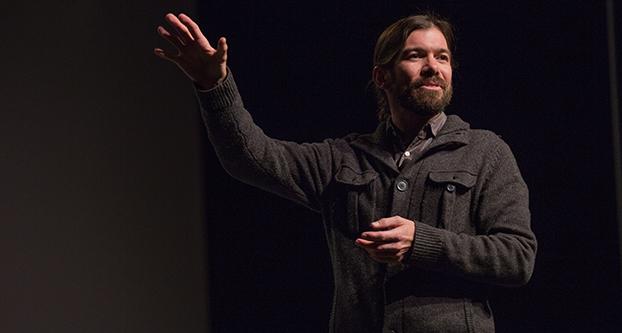Fresno State Talks kicked off the first of its three week student-nominated lecture series last night with award-winning documentary filmmaker and professor of media production Jes Therkelsen.
Therkelsen’s projects have spanned five continents confronting human rights and environmental issues. His films have been screened worldwide and won several awards as a traveler, geologist, educator and activist.
Working with Therkelsen for a service-learning trip in Fiji this past winter, Chris Fiorentino, Director of the Jan and Bud Richter Center for Community Engagement and Service-Learning, looked forward to Therkelsen’s presentation.
“One of the reasons I’m excited, Jes has a great way of looking at things from a different perspective and helping others to look at things from a different perspective too, so I’m really excited to hear about stories and media and how we learn through those,” Fiorentino said.
“He was such a great part of the trip, because he helped everybody, the students and faculty members, think about what we were experiencing in different ways.”
Therkelsen’s presentation, “The stories we weave, the stories we believe and the stories we leave behind,” explored how humans use narrative structure to share and interpret life experiences.
“As a documentary filmmaker, I think about reconstructing reality, reimagining reality and fitting it into a story form,” Therkelsen said. “I think about story quite a bit, and I can see that it’s really universal, it’s ever-present, it’s ubiquitous, it’s everywhere. Story is something that we can see in so many different aspects of our lives.”
Therkelsen prompted the audience by asking why humans connect so deeply to story, why we crave it and why we create stories in our lives.
“How do we impose emotion onto events? There’s more to a story than simply a sequence,” Therkelsen said. “ The magic of storytelling comes from this: you are bringing your own background into it, your own emotion into it.”
“It’s a narrative that we’re all part of, and all participants in,” he said.
Therkelsen spoke about the extent, scope and importance of communication in life. He said storytelling was an essential component to how we live our lives, ranging from science, to history, sports, religion, politics and even courtroom television drama.
“With politics, it’s almost like this retroactive narration,” Therkelsen said. “Things happen, and then after they happen, someone tells you what happened. There’s this reconstruction of a story, and it’s easier to remember a story.”
Therkelsen said that many times we don’t realize that we are storytelling, alluding to the duplicitous meaning of language. Storytelling isn’t dead, Therkelsen said, and its modern applications are a powerful tool. He used Columbia University Medical Center’s program in narrative medicine as an example.
“The whole mission of this is to give doctors the narrative confidence to be moved by the story of illness,” Therkelsen said. “You go to the doctor, they ask you what happened, what’s wrong, so you give them a story. So this is a medical program to help doctors understand narration–how illness can be helped by understanding narration.”
Therkelsen also noted the psychological implications of storytelling, explaining the individual’s own experience with narratives.
“When is your act break? Are you expecting something? Are you the hero of the story, are you a supporting character? Are you waiting to be rescued?” Therkelsen asked. “Are we waiting, as Aristotle put it, to neatly tie all the loose ends together? Does that ever happen in life, and does that make us depressed? Because we are waiting for that, for that moment of release, when everything is just right at the end of a story. Yet in life, it never really works out that way.”
After nourishment and love, Therkelsen said, the need to tell stories is essential to who we are as humans. The way we learn and understand, he said, is through the narrative form.
“The entirety of human knowledge is based on story,” Therkelsen said. “How long did we have oral history? The entirety of what we know is based on story. We create a concept of ourselves in the same narrative form.”
“Does it not make sense that in order to feel this experience of being alive as deeply as we possibly could, why wouldn’t we connect with story?”




